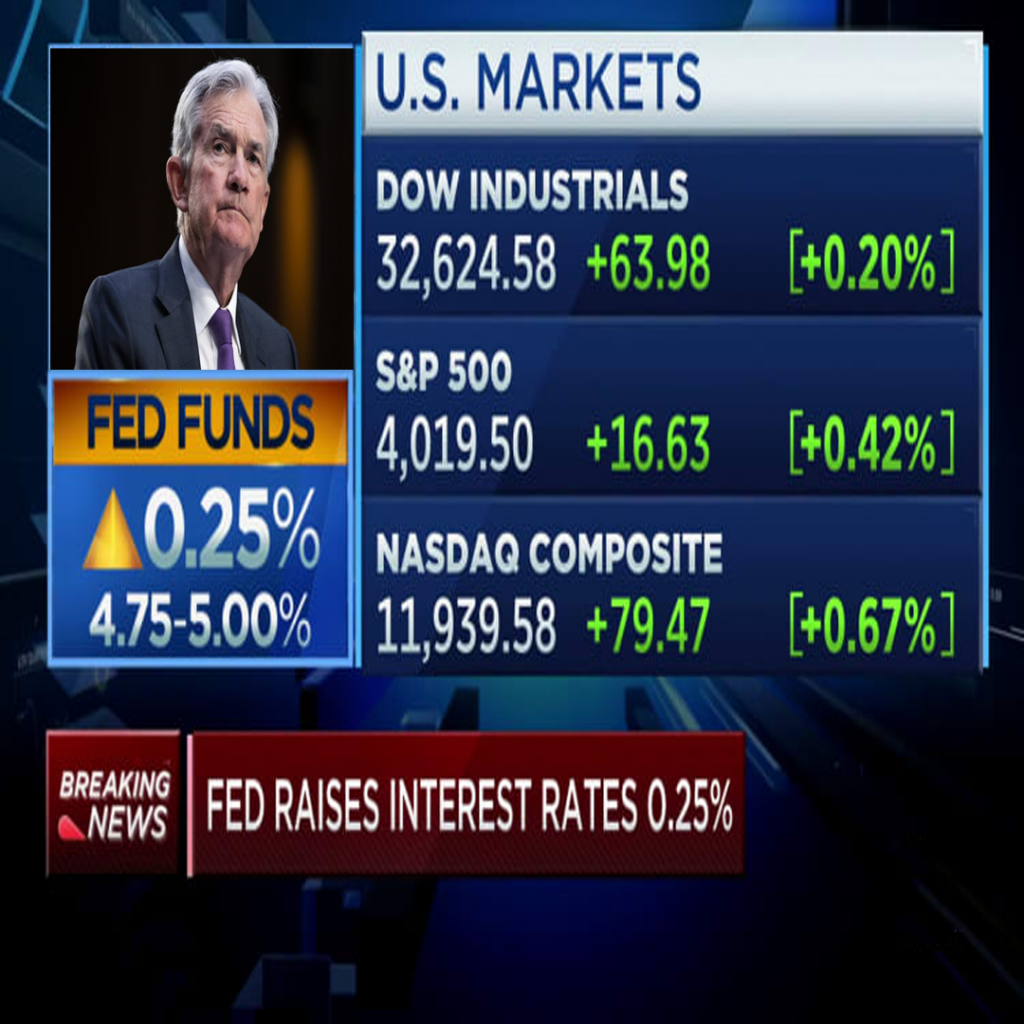Digital Zeitgeist – A Quarter Point Increase In Interest Rates By The Federal Reserve Of The US In The Midst Of Banking Turmoil And Financial Instability
The Federal Reserve has announced that it would raise interest rates to a range of 4.75% to 5%. This is the Fed’s ninth consecutive rate hike and the highest rate since 2007.
The Federal Reserve decided to keep battling price increases and announced another boost in interest rates despite the greatest financial crisis since 2008 and the worst inflation rate in a generation.
The Federal Reserve of the United States announced on Wednesday that it would raise its benchmark interest rate by another quarter of a percentage point, bringing the range of possible rates to between 4.75 and 5%. This marks the ninth consecutive increase in the rate, and it is the highest rate since 2007. A year ago interest rates were close to zero.
The most recent rise was less than the increase of a half percent that some people had anticipated before a string of bank failures rattled markets across the world.
The Federal Reserve noted in a statement that the effects of the financial crisis were “uncertain,” while inflation “remains elevated.”
Fed Chair Jerome Powell said that the central bank had discussed suspending interest rate hikes in the days leading up to the decision, but ultimately came to the conclusion that the banking crisis was under control and that more rate hikes were required to drive down inflation.
“We are committed to restoring price stability and all of the evidence says that the public has confidence that we will do so,” he said. “It’s important that we sustain that confidence with our actions as well as our words.”
The recent changes in interest rate policy implemented by the Federal Reserve have been connected, at least in part, to the failure of Silicon Valley Bank (SVB) earlier this month. The value of the long-term assets that SVB had invested its deposits in had decreased as a result of rising interest rates. These losses panicked depositors, which resulted in a rush to withdraw their money from the bank.
Powell called SVB an “outlier” that had “failed badly”. He argued that the US banking system remained strong but added “it is clear we do need to strengthen supervision and regulation”.
The rate of inflation is still a concern on a worldwide scale. Last month, the annual rate of inflation in the United Kingdom reached 10.4%. It is anticipated that the Bank of England will increase interest rates today in an attempt to bring prices down. This week, the European Central Bank increased interest rates by a half of a percentage point, despite the fact that the banking crisis was rocking Credit Suisse, the second largest bank in Switzerland. According to the ECB, inflation in the eurozone now stands at an average of 8.5% and is expected to stay high “for too long” if there are no further increases.
Powell has said on several occasions that the most important objective of the Federal Reserve is to get inflation under control. Prices were 6% higher in February than they were a year earlier, which is far lower than the 9.1% annual rate of inflation that was recorded in June of last year, but it is still a significant distance from the 2% objective that the Federal Reserve has set for inflation.
Before SVB’s collapse Powell told a Senate banking committee: “Although inflation has been moderating in recent months, the process of getting inflation back down to 2% has a long way to go and is likely to be bumpy.”
After Powell’s statement, market watchers began to ponder the possibility that the Federal Reserve will raise interest rates by an additional 50 basis points following its meeting in March. But, because of the banking crisis, their estimates are no longer accurate.
Concerned depositors withdrew their money from New York’s Signature Bank in the wake of the failure of SVB, which caused that institution to suffer a crisis of its own. During the past weekend, Swiss officials were able to mediate a deal that would result in Credit Suisse being acquired by one of its bigger competitors, UBS. The largest banks on Wall Street were forced to intervene in order to save another mid-sized American bank called First Republic, the share price of which had plummeted as depositors withdrew their money.
The Federal Reserve’s most recent announcement did include some hints that the Fed’s recent string of rate hikes may be coming to an end. The phrase that the committee anticipated “ongoing increases” in rates would be appropriate was removed from the officials’ statements and replaced with the following: “The committee anticipates that some additional policy firming may be appropriate.” This phrase was used in each of the officials’ previous eight statements.
The Fed’s decision to keep increasing rates to battle inflation, coming after the European Central Bank made the same judgment, raises the probability that the Bank of England will follow suit on Thursday (today).
online sources: theguardian.com, federalreserve.gov

